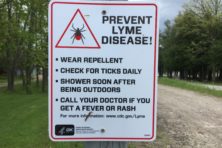Article posted Thursday, August 12, 2010 10:41pm
- Share
- Tweet
- Pin
- Share
• Perhaps it’s time to accept the promise of marijuana (or cannabis) for medical use. In 14 states, Canada, the Netherlands, and Israel, doctors can prescribe smoking cannabis for clearly diagnosed medical conditions. There has been a surge in research on the use of cannabis to treat a number of medical conditions, including multiple sclerosis, various inflammatory reactions, and even growth of cancer cells. Using cannabis can alleviate pain and nausea in AIDS and cancer patients, and recent research indicates that the major chemical found in cannabis can kill various cancer cells under lab conditions.
The active chemical that produces these effects is called THC (for delta-9-tetrahydrocannabinol). In one experiment, patients with MS were divided into two groups. One group received cannabis or its derivative, while the other group received a placebo. Most of the patients receiving cannabis showed improvement in muscle spasticity, sleep quality, shakiness, sense of well being, and mobility. Cannabis may also be useful in treating post-traumatic stress disorder (PSD) in soldiers returning from battle – experiments with rats showed that THC “speeds up the rate at which the animals forget unpleasant experiences.”
New methods to deliver THC to patients are being devised, including a nasal spray, capsules, and a special vaporizer. The nagging problem with cannabis is to ensure that its medical use is carefully regulated, for chronic cannabis use has some deleterious long-term effects on brain function. (Science News, June 19, 2010)
• In a small cave in Botswana, archeologists discovered remnants of a primitive people that worshiped the python about 68,000 years ago. Some believe the seeking of spirituality is hard-wired in the brain.
• Recently there have been a number of political assaults on scientists and their findings (e.g., whether there is such a thing as global warming). What most people don’t know is that there is always uncertainty associated with scientific conclusions, especially at the time they are first reported. Scientists accept discoveries only after many others have tested the initial studies and come to the same conclusion. The theories and discoveries of Galileo, Pasteur, Darwin, and Einstein have been rigorously tested by other scientists, and found acceptable as truth. The scientific process is inherently adversarial. Scientists build their reputations and gain recognition not only for their discoveries, but even more so for proving the findings of other scientists to be incorrect. Scientists make mistakes, no doubt about that, but good science soon cancels out such mistaken findings.
• Workers at the University of Wisconsin in Madison, led by Sarah Olson, provided evidence that in some tropical areas where the forest has been clear-cut, the incidence of malaria may increase up to 50 percent. The apparent cause is a substantial increase in the population of mosquitoes that transmit the parasite. Olson’s colleague, Jonathan Patz, said “If we keep treating diseases like malaria and other infectious diseases without understanding the underlying determinants of disease transmission, it’s equivalent to mopping up the floor without turning off the faucet.” (paper by Olson and Patz in the journal Emerging Infectious Diseases [2010], and reported in the Milwaukee Journal Sentinel)

